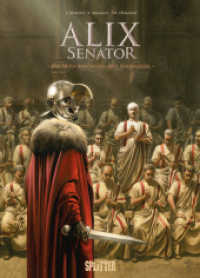Full Description
Twilight Zone Anthropology provides an engaging and multifaceted picture of anthropology in Poland, Bronislaw Malinowski's motherland, with a comprehensive introduction describing the discipline's history thus far, and thematic contributions detailing diverse and innovative contemporary practices that foreshadow rich possibilities for its future. It makes the compelling argument that Polish anthropology should be seen to have developed within a twilight zone of contact between `imperial' discourses of a French-Anglo-US disciplinary hegemony and an Eastern European intellectual and political heritage.Initially deriving from a conference hosted by the Royal Anthropological Institute, Twilight Zone Anthropology provides a palpably vibrant sampling of a `cosmopolitan Polish national anthropology', with discussions of a wide-range of disciplinary issues, such as gender, memory, engagement, activism, health and politics. Offering many insights as to how anthropology may be practised so as to evolve original conceptions and contributions to world anthropologies from a decentred context, in response to global trends, this work represents a significant step forward in the ongoing redefinition of global hierarchies of knowledge and the creation of a pluriversal anthropology.
Contents
Introduction: Twilight zone anthropology - Michal Buchowski; Chapter 1: Polish anthropology yesterday and today: An impossible overview - Michal Buchowski; Chapter 2: Subversive brilliance: Jozef Obrebski's theory of ethnic diversity and the hierarchizations of knowledge in Polish academia - Marcin Lubas; Chapter 3: Sex, gender and Polish socio-cultural anthropology: A historical and auto-ethnographic account - Grazyna Kubica; Chapter 4: Memory and the past as subjects of study in Polish anthropology - Katarzyna Kaniowska; Chapter 5: Public, engaged and activist: The dead-ends of contemporary anthropology - Marcin Brocki; Chapter 6: Engagements and disengagements in contemporary Polish anthropology - Hana Cervinkova; Chapter 7: Experimental anthropology? Action-research in urban activism - Kacper Poblocki; Chapter 8: Anthropology and gender/queer studies in contemporary Poland: A personally situated view -Monika Baer; Chapter 9: Feminist anthropologists meet the ideology of gender - Agnieszka Koscianska and Magdalena Radkowska-Walkowicz; Chapter 10: Democracy and the highlanders: On the diversity of meanings - Anna Malewska-Szalygin: Chapter 11: Christians in the biomedical embrace: The refusal of blood transfusions among Jehovah's Witnesses in Germany - Malgorzata Rajtar; Contributors; Index.







